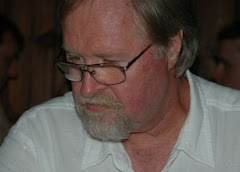
By Phil Gibson
My maternal grandmother was a holy person. Not in the Mother Theresa sense of the word,
but in the small town, churchy way of mid-century Ontario where religion still
played a large part in peoples’ everyday lives.
Although her usually unsmiling, thin-lipped appearance made her seem
more severe than she ever was with me, she was seldom quick to anger. But when her thin face reddened, the only
expletive I ever heard her use was “bless-ed”,
as in: “… that bless-ed delivery man
didn’t leave any milk again!” The
milkman wasn’t blessed in the clerical sense.
He would have been damned for his oversight if she had allowed herself
to use the word. But she was a product
of her upbringing – one in which restraint, respect and community were
paramount. Instead, with the simple
pause and the emphasis on the first syllable, Nana turned an otherwise
sanctified phrase into a useful expression of her ire.
If she had lived to see what we have wrought, the boomer
generation would have earned the same gentle condemnation as she reserved for
the milkman. While she never saw wrong
in anything I did, she didn’t know all of it.
If she had been around for the great reckoning, she might have turned a
phrase or two of disapproval with some of the excesses. Instead, she went to her grave believing that
the world was now safe from the Hun and that the good lord would look after the
rest. She would not have imagined how
kids who could exhaust their baser instincts chasing frogs all day in the creek
could come to believe they needed much more out of life. She would not have understood how an acquisitive
nature would one day supplant the simple virtues that she and her community had
instilled in them and tried to instil in us.
Raising Uber-consumers
It is received wisdom nowadays that it takes a village to
raise a child. Well I was raised in a
post-agrarian community, where doors were never locked because nobody had much
to steal, and people greeted each other by name on the main street. I knew I could have anything I needed by
going to a neighbour’s door and asking for it.
Our expectations were so limited at that early stage of life that it
would never occur to us to ask for more.
But by the time our generation was out of our teens, things were
different. Unlimited access to the
trappings of postwar industrialism, fuelled by low energy costs and mass
marketing, had unleashed the űber-consumer
in all of us. I often wonder if it
takes a village to raise someone who turns out like that, is there any limit to
what a whole city can do?
Our generation was blessed in so many ways it’s hard to
count them. When my parents celebrated their
60thwedding anniversary, I thanked them for bringing us into a world
of such promise that it gave us the confidence to experiment with our
future. Bracketed by the Great
Depression and the Second World War, their own youthful lives permitted no such freedom. They took pleasure in simple things, like
home and family and weekend escapes to the rural backdrop of their own
upbringing. They also paid the daily
price of a psychological burden, knowing how easily their lives could be
disrupted again.
Their experience produced two people who could wear
adversity like a comfortable old coat.
They had a tolerance for things that would have sent weaker souls into a
tailspin. They also had, if not a
joyless existence, a gritty aura of forbearance about them that dampened
enthusiasms while it armed them against hardship. Theirs was not a singular experience, but
rather the continuation of an ageless way of life shared by the less advantaged
in every era. Lived within its
boundaries, this existential homestead left you with the sense that heightened
expectations could be more trouble than they’re worth.
Engines of Hope
That was not common to everyone. The result of putting war-time deprivation
behind them was a mindset of optimism
among the post-war generations that may never have been equalled in all of
history. The Second World War was played
out on such a wide scale that it marked the existence of human beings
everywhere. The engines of war-time
devastation required such ingenuity in design, production and distribution that
they drove an unprecedented postwar economic boom in Europe, the Americas and many parts of Asia. Rather than draining away all youthful verve,
the war caused an explosion of demand and a juggernaut of productivity that has
been with us ever since. .
On an historic scale, it’s hard to imagine a similar
experience. Since the Middle Ages, when
everyone was impoverished, the underclasses have been downtrodden in every
way. Not until the revolutions of the 18th
and 19th centuries did the masses get to fondle the golden
ring. The First World War produced a
splurge of optimism throughout the 1920s that was nearly extinguished by the
Great Depression. Not until the middle
of the 20th century was prosperity broadly available. Then mass communications, in the shape of the
ubiquitous TV screen, sparked an explosion of expectations to match all the
output of the industrial age.
Against the ensuing backdrop of my own charmed life, the
deathbed admission by my father was stark.
He was muttering weakly to himself when I entered his hospital room on
one of our last visits … something about seeing that “the kids” were taken care
of. My next eldest sister and I were in
our sixties at the time, with decades of experience fending for ourselves.
Then this whispered declaration caught my attention: “Mother was never happy,” he said, with a
resigned shrug.
‘Why?’ I asked, less surprised than riveted by his sad
admission. I couldn’t help intruding on
the privacy that his semi-consciousness afforded him.
“Because she never had the things in life she thought she
should,” said Dad.
Then, without prodding, he added in the same feeble
vein: “I was never happy”.
“Why,” I asked again.
“I guess because I never was the man I thought I should be,”
he concluded with another shrug.
Revelations like this were occasional during the long period
of my parents’ decline. They came as no
great surprise to anyone who knew the secrets of their lives together.
Contrary to Dad’s perception, Mother wasn’t any more
motivated by things than many of her generation who survived Depression and war-time
uncertainties. She emerged from the
experience with a homemaker’s pride of place and a healthy appreciation for
what she had. But she was easily content
with the household improvements and occasional vacations that their modest
income could provide.
Dad bought her a diamond ring for their sixtieth anniversary
– a peace offering as much as it was a symbol of their six decades
together.
After she died, living on several pensions and the proceeds
of the sale of their home, my father broke down several times, exclaiming: “I never had so much money.” The tears weren’t for the bounty. As he said so lucidly after a lifetime of
saving: “My only regret is that mother
never got to enjoy it.”
Living the Dream
Living the dream has been a rare trip for those of us who
were cosseted in the postwar era. As I
add these words to my memoirs on Canada Day 2012, I am reminded again that my
bless-ed generation lived a charmed existence spared of war, famine and
pestilence. Maybe unique among the
inheritors of the earth, we enjoyed a splendid isolation from the burdens of
existence that have weighed on most mortals for millennia.
The legacy of our ancestors among the two founding nations
was one of optimism, resilience, initiative and progressive thinking. It also left us with a reservoir of
self-importance, determinism and yes, of entitlement.
These same circumstances left us with qualities that have
evolved from our common experience: of
openness, tolerance for diversity, adaptability and so far, an unshakeable
resolve to succeed together.
In recent years we have been blamed for the uncertainty our
offspring have to deal with: a broken
health care system, underfunded pension obligations, as well as free will and
individualism taken to extremes. It is
understandable, in the historical context, and not all of it is undeserved. Given where we came from – our roots in a
post-agrarian society whose bedrock values left little room for artifice or
extravagance – it is sometimes a heavier burden now that the impending collapse
of the global economy has forced us to recognize our excesses.
On this national day of celebration I find hope in the fact that
we are Canadian. Together we have
overcome adversity, defied all odds against our survival as a nation and
enjoyed the prosperity that our initiative has brought us.
As the connective tissue between our ancestral generations
and our descendants, I hope we have passed on strengths as well as the
weaknesses. And as a Canadian from a line that reaches back to the 1830s, I
still have faith and hope that these values will see our offspring through their
challenges as they saw our forefathers through theirs.
West Quebec
Canada Day 1 July, 2012

